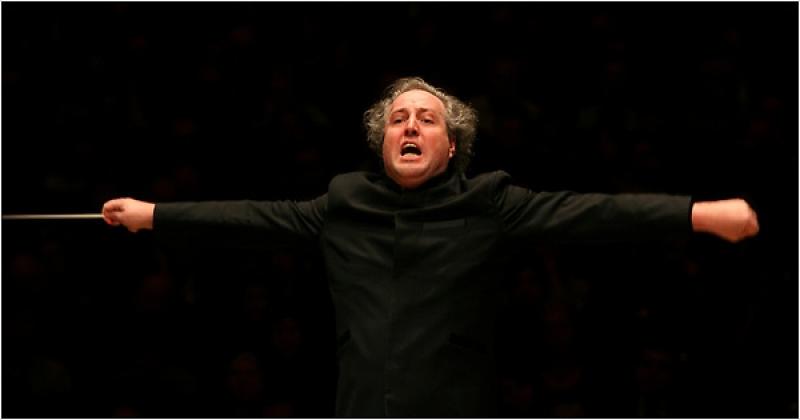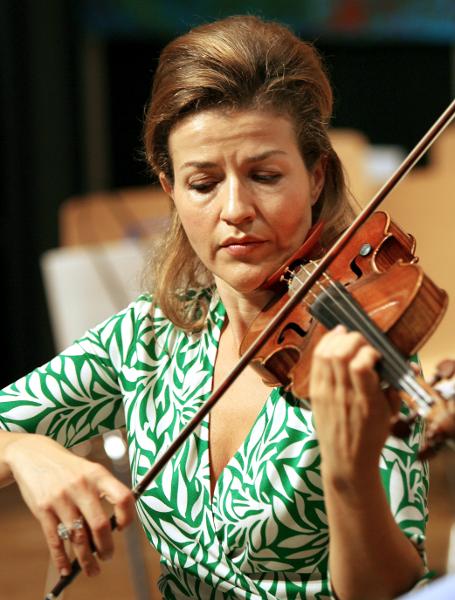BBC Proms: Mutter, Pittsburgh Symphony Orchestra, Honeck | reviews, news & interviews
BBC Proms: Mutter, Pittsburgh Symphony Orchestra, Honeck
BBC Proms: Mutter, Pittsburgh Symphony Orchestra, Honeck
Big, bold and brash: a riveting and very American performance of Mahler Five

Earlier this year, conductor Manfred Honeck revealed to me his love of old vinyl: the crackle, the fizz, the lost musical traditions. His performances are marinated in this obsession. The idiosyncrasies of his interpretations hark back to a time when the rules were fewer and the colours brighter. Last night was no different. His Mahler Five steered clear of the sleep-inducing modern fixations with orchestral homogeneity and tastefulness and instead jumped right off the deep end.
It was bracing stuff - not from the word go (these sort of lights need a fair bit of cranking up before they begin to truly blaze) but soon enough. With brass firmly taking hold of the acoustic tiller (and the horn solo still to come), this symphony quickly settled into a bright and brash concerto for brass and orchestra. The second movement saw a maelstrom of Expressionistic colour and Romantic style - sharp marcatos, lush portamenti and foghorn brass - explode into the auditorium.
Of the many interventions in the third movement (including some extraordinary piston-pumping horn calls), the refashioning of the four-note motif into something that could be (and was) danced to was most bold. If some of the string work went a little ragged in the fugue finale, they more than made up for it in the Adagietto, showing what precision they could deliver even at full emotional tilt.

If this was for some another overly red-blooded performance, at least it stood out. At least Honeck had the daring to make a statement. And mostly it was a riveting statement. Besides, for those who were harbouring doubts that the Pittsburghers could deliver meekness and mildness as successfully as they could flex their muscles, there was the first half to behold.
Rarely, if ever, has an opening so comprehensively shunned the usual bombastic fanfare in favour of such an intense spectral quality. The eternal tripper-upper of great orchestras, the Lohengrin Overture, was impeccably handled, its depths radiantly plumbed by the Pittsburghers. Following it was a much more literal high-wire act, Wolfgang Rihm's violin concerto, Gesungene Zeit (1991-2), being performed last night by the work's original dedicatee, Anne-Sophie Mutter (pictured above).
Floating for much of its half-hour length above the tree line in the land of the harmonic and high up on the E string, this thinly textured yet thickly cogent piece bowled me over when I first heard it in 2004 at the Barbican. Inevitably the high sung line sounded more ethereal, more etiolated, in the Royal Albert Hall. But whereas before, its form and texture had hit me between the eyes, this time it worked on me as might a passing ghost. Its relationship to the orchestra was interesting, especially in the context of the first work. While the stratospheric flights of Lohengrin clearly have a landing point - a place to meet and grace the ground - in Gesungene Zeit, the orchestral ground appears only to emphasise the violin's distance and loneliness.
Encores abounded. Mutter delivered the nearest thing we got to a corporeal presence in the first half: an exquisitely personal, intensely eloquent rendition of the Sarabanda from Bach's Second Partita. Swagger and subtlety filled Honeck's two choices after the Mahler. First, a delightful and delicate Dragonfly Waltz from Josef Strauss was twitched into life. Then we got a romp through the final waltz of the Rosenkavalier Suite. Competitive rivalry will no doubt see the Philadelphia Orchestra (the other Pennsylvanian orchestra) raise their game for their Thursday visit. But the Pittsburghers' generous and characterful performances will take some beating.
Share this article
Add comment
The future of Arts Journalism
You can stop theartsdesk.com closing!
We urgently need financing to survive. Our fundraising drive has thus far raised £49,000 but we need to reach £100,000 or we will be forced to close. Please contribute here: https://gofund.me/c3f6033d
And if you can forward this information to anyone who might assist, we’d be grateful.

Subscribe to theartsdesk.com
Thank you for continuing to read our work on theartsdesk.com. For unlimited access to every article in its entirety, including our archive of more than 15,000 pieces, we're asking for £5 per month or £40 per year. We feel it's a very good deal, and hope you do too.
To take a subscription now simply click here.
And if you're looking for that extra gift for a friend or family member, why not treat them to a theartsdesk.com gift subscription?
more Classical music
 Echo Vocal Ensemble, Latto, Union Chapel review - eclectic choral programme garlanded with dance
Beautiful singing at the heart of an imaginative and stylistically varied concert
Echo Vocal Ensemble, Latto, Union Chapel review - eclectic choral programme garlanded with dance
Beautiful singing at the heart of an imaginative and stylistically varied concert
 Scott, Irish Baroque Orchestra, Whelan, RIAM, Dublin review - towards a Mozart masterpiece
Characteristic joy and enlightenment from this team, but a valveless horn brings problems
Scott, Irish Baroque Orchestra, Whelan, RIAM, Dublin review - towards a Mozart masterpiece
Characteristic joy and enlightenment from this team, but a valveless horn brings problems
 Classical CDs: Voice flutes, flugelhorns and froth
Baroque sonatas, English orchestral music and an emotionally-charged vocal recital
Classical CDs: Voice flutes, flugelhorns and froth
Baroque sonatas, English orchestral music and an emotionally-charged vocal recital
 Kanneh-Mason, Britten Sinfonia, Shave, Milton Court - a grin and a big beaming smile
A pair of striking contemporary pieces alongside two old favourites
Kanneh-Mason, Britten Sinfonia, Shave, Milton Court - a grin and a big beaming smile
A pair of striking contemporary pieces alongside two old favourites
 theartsdesk at the New Ross Piano Festival - Finghin Collins’ musical rainbow
From revelatory Bach played with astounding maturity by a 22 year old to four-hand jazz
theartsdesk at the New Ross Piano Festival - Finghin Collins’ musical rainbow
From revelatory Bach played with astounding maturity by a 22 year old to four-hand jazz
 First Person: Manchester Camerata's Head of Artistic Planning Clara Marshall Cawley on questioning the status quo
Five days of free events with all sorts of audiences around Manchester starts tomorrow
First Person: Manchester Camerata's Head of Artistic Planning Clara Marshall Cawley on questioning the status quo
Five days of free events with all sorts of audiences around Manchester starts tomorrow
 Goldscheider, Brother Tree Sound, Kings Place review - music of hope from a young composer
Unusual combination of horn, strings and electronics makes for some intriguing listening
Goldscheider, Brother Tree Sound, Kings Place review - music of hope from a young composer
Unusual combination of horn, strings and electronics makes for some intriguing listening
 theartsdesk Q&A: composer Donghoon Shin on his new concerto for pianist Seong-Jin Cho
Classical music makes its debut at London's K-Music Festival
theartsdesk Q&A: composer Donghoon Shin on his new concerto for pianist Seong-Jin Cho
Classical music makes its debut at London's K-Music Festival
 Helleur-Simcock, Hallé, Wong, Bridgewater Hall, Manchester review - moving lyricism in Elgar’s concerto
Season opener brings lyrical beauty, crisp confidence and a proper Romantic wallow
Helleur-Simcock, Hallé, Wong, Bridgewater Hall, Manchester review - moving lyricism in Elgar’s concerto
Season opener brings lyrical beauty, crisp confidence and a proper Romantic wallow
 Kohout, Spence, Braun, Manchester Camerata, Huth, RNCM, Manchester review - joy, insight, imagination and unanimity
Celebration of the past with stars of the future at the Royal Northern College
Kohout, Spence, Braun, Manchester Camerata, Huth, RNCM, Manchester review - joy, insight, imagination and unanimity
Celebration of the past with stars of the future at the Royal Northern College

Comments
...
...
Thanks for being patronising
...
...
And just for completeness,